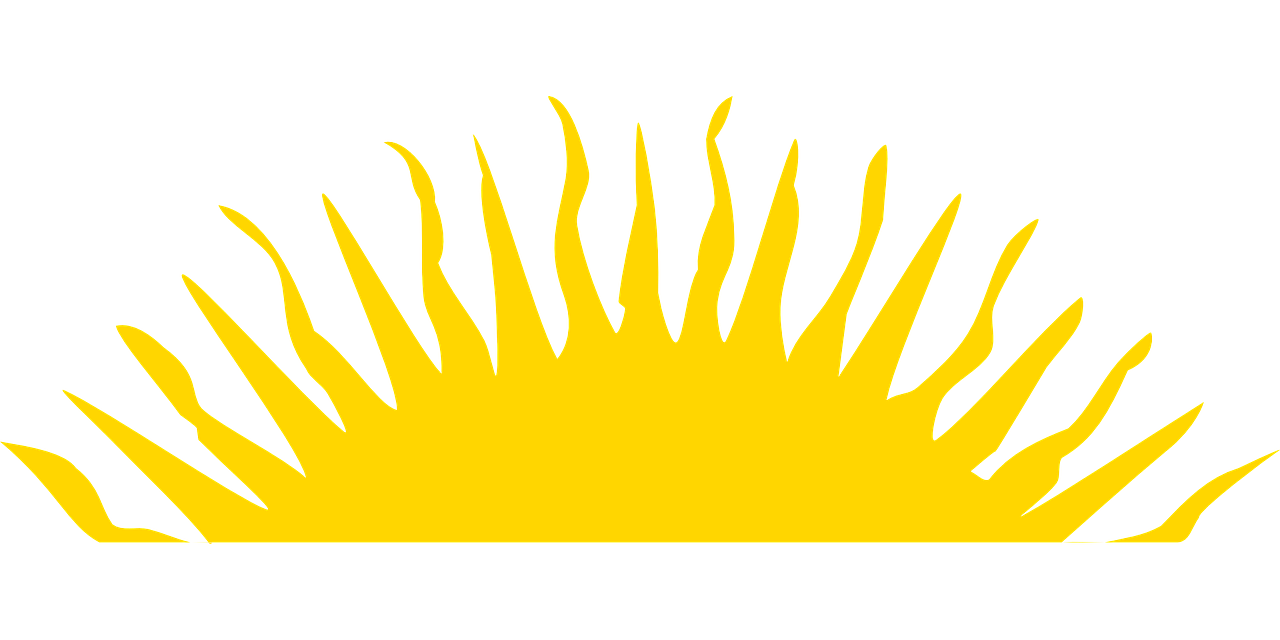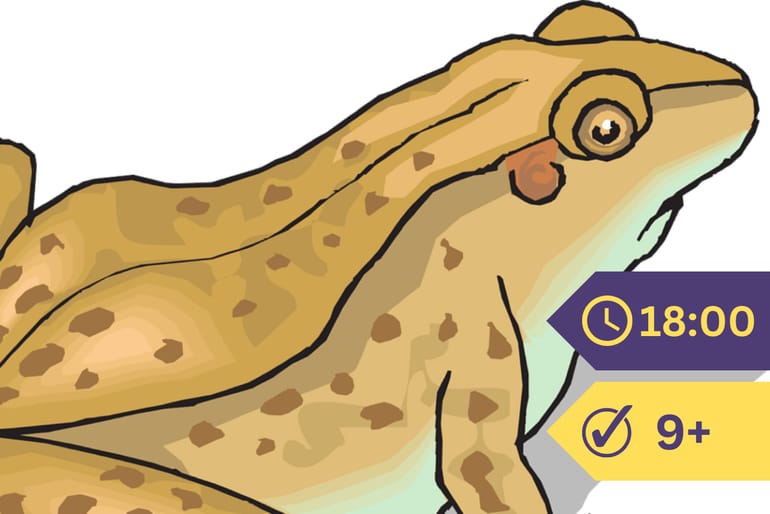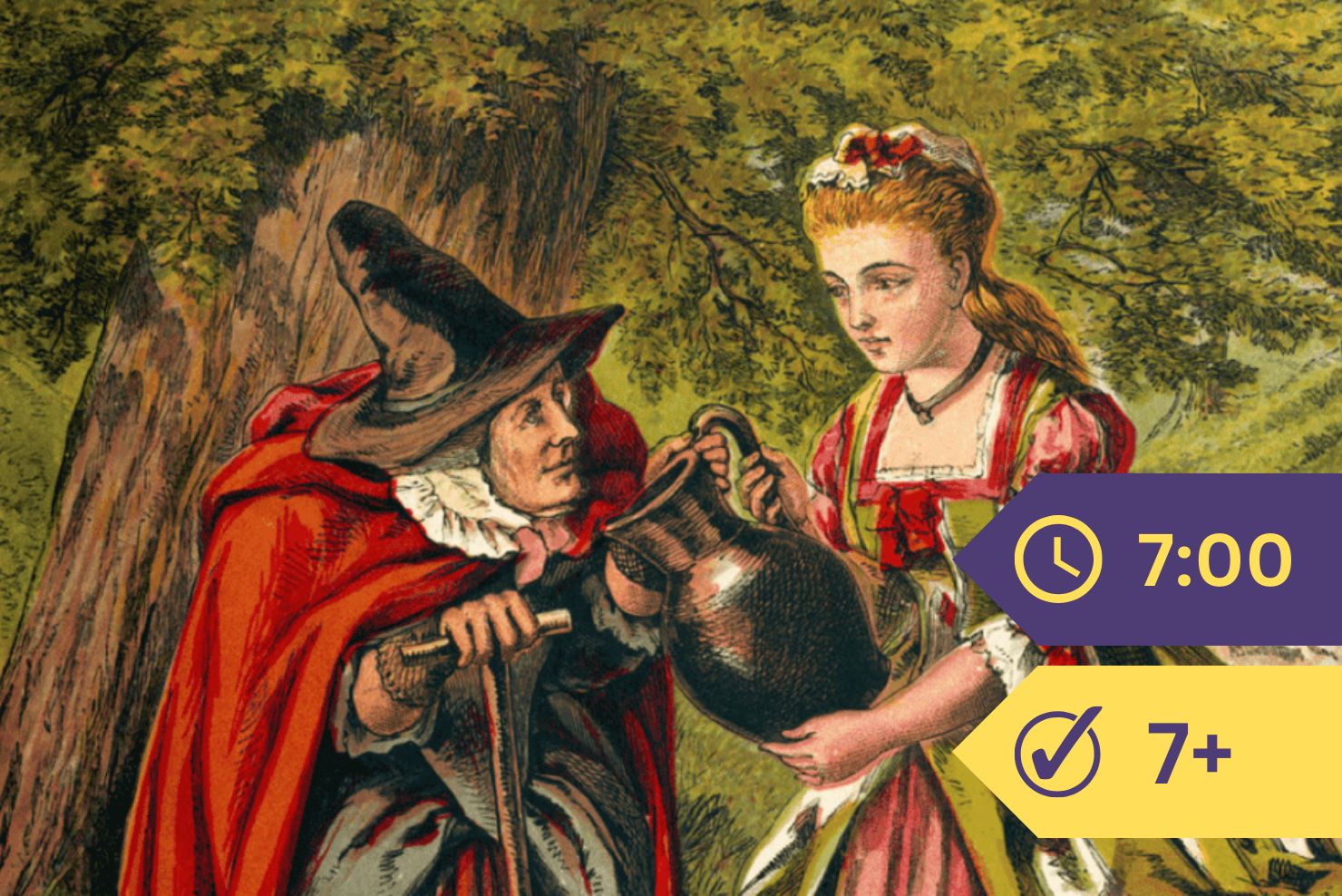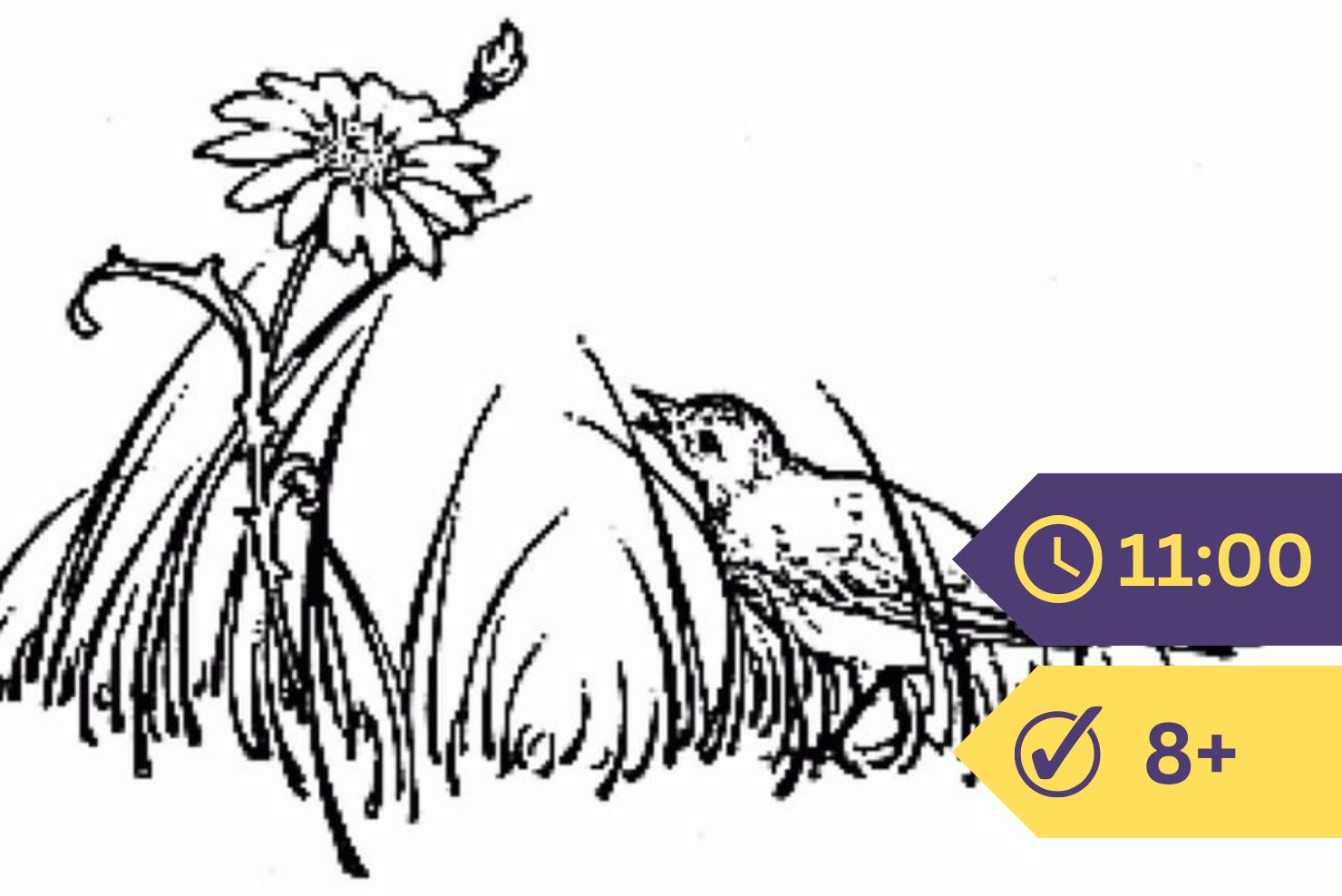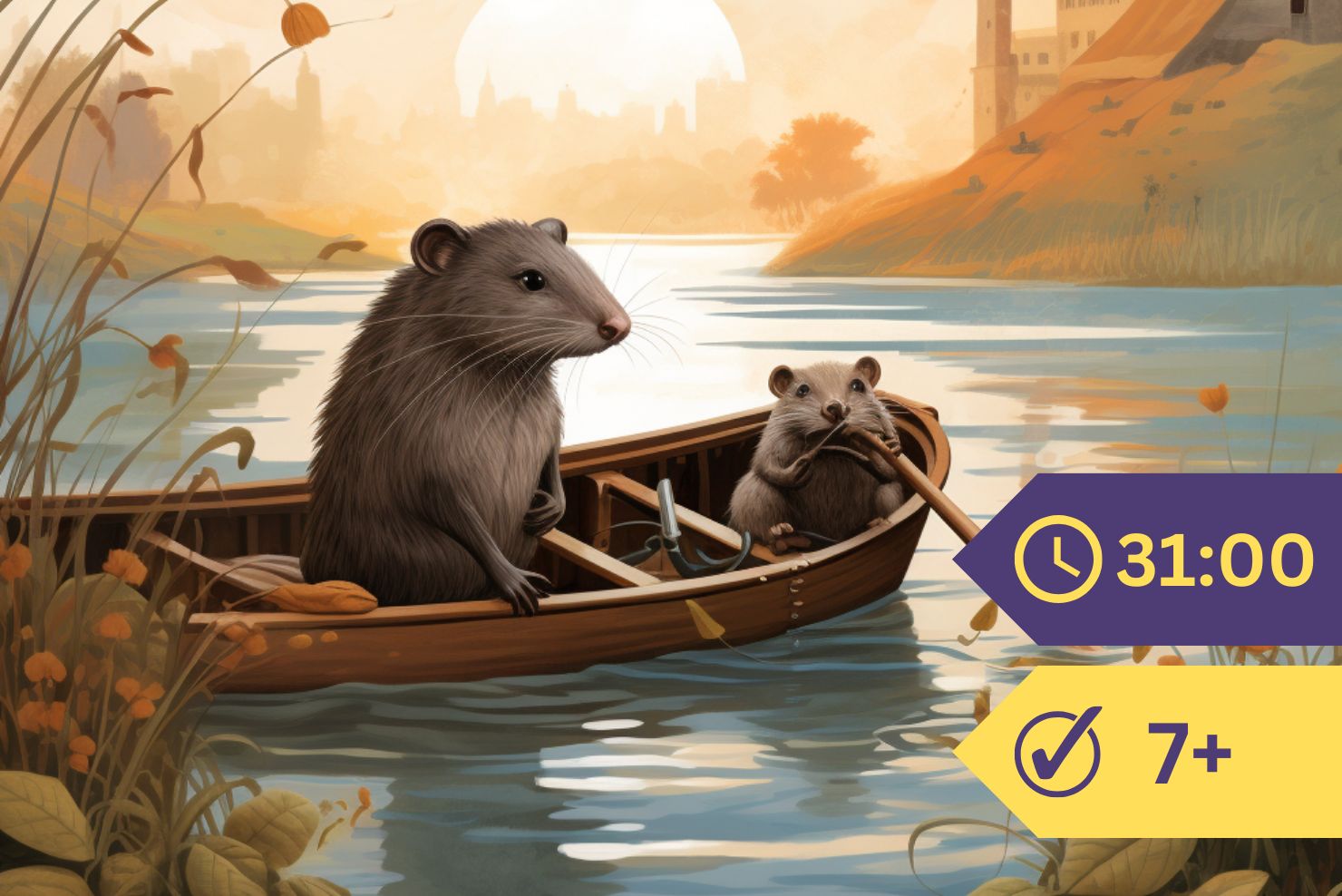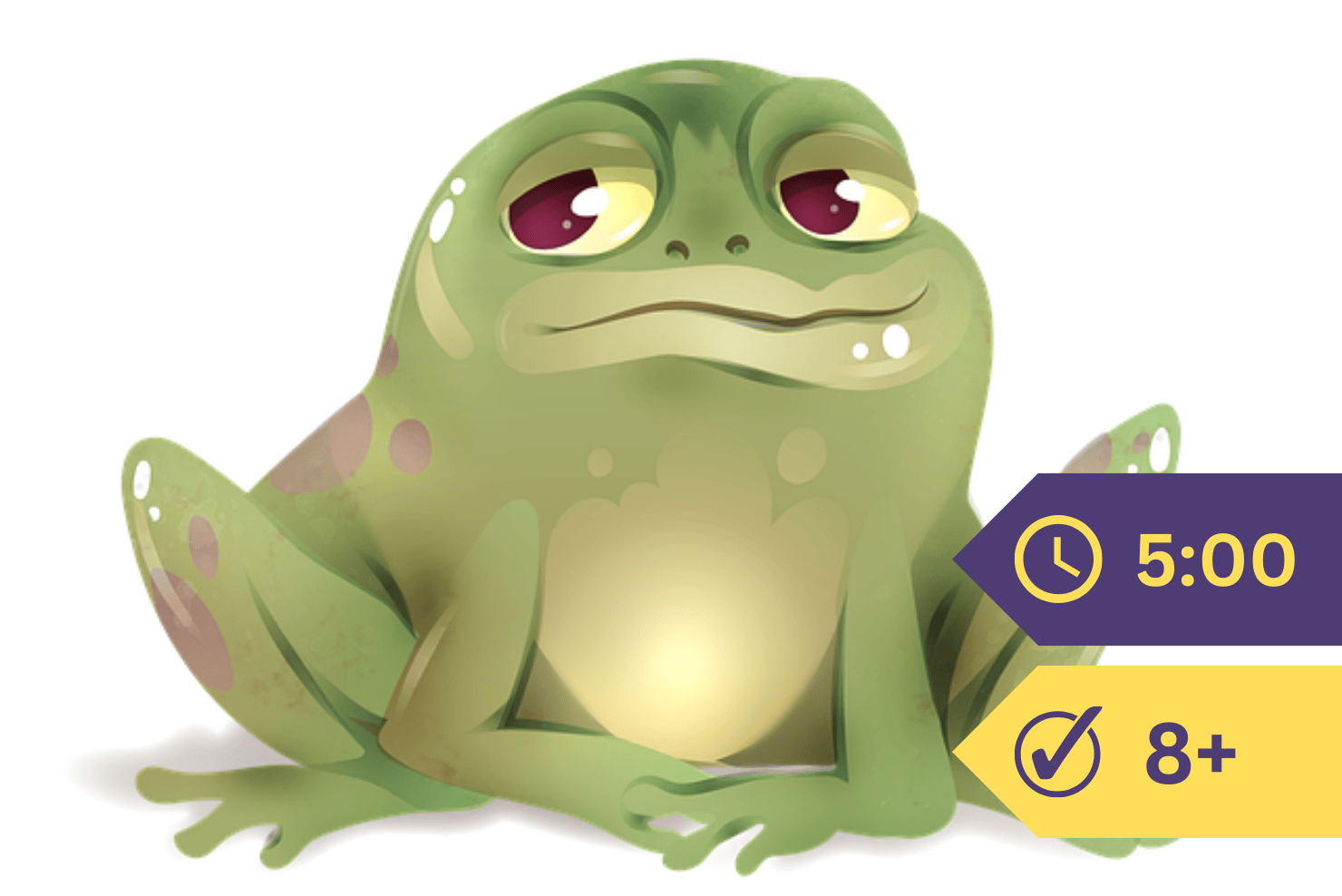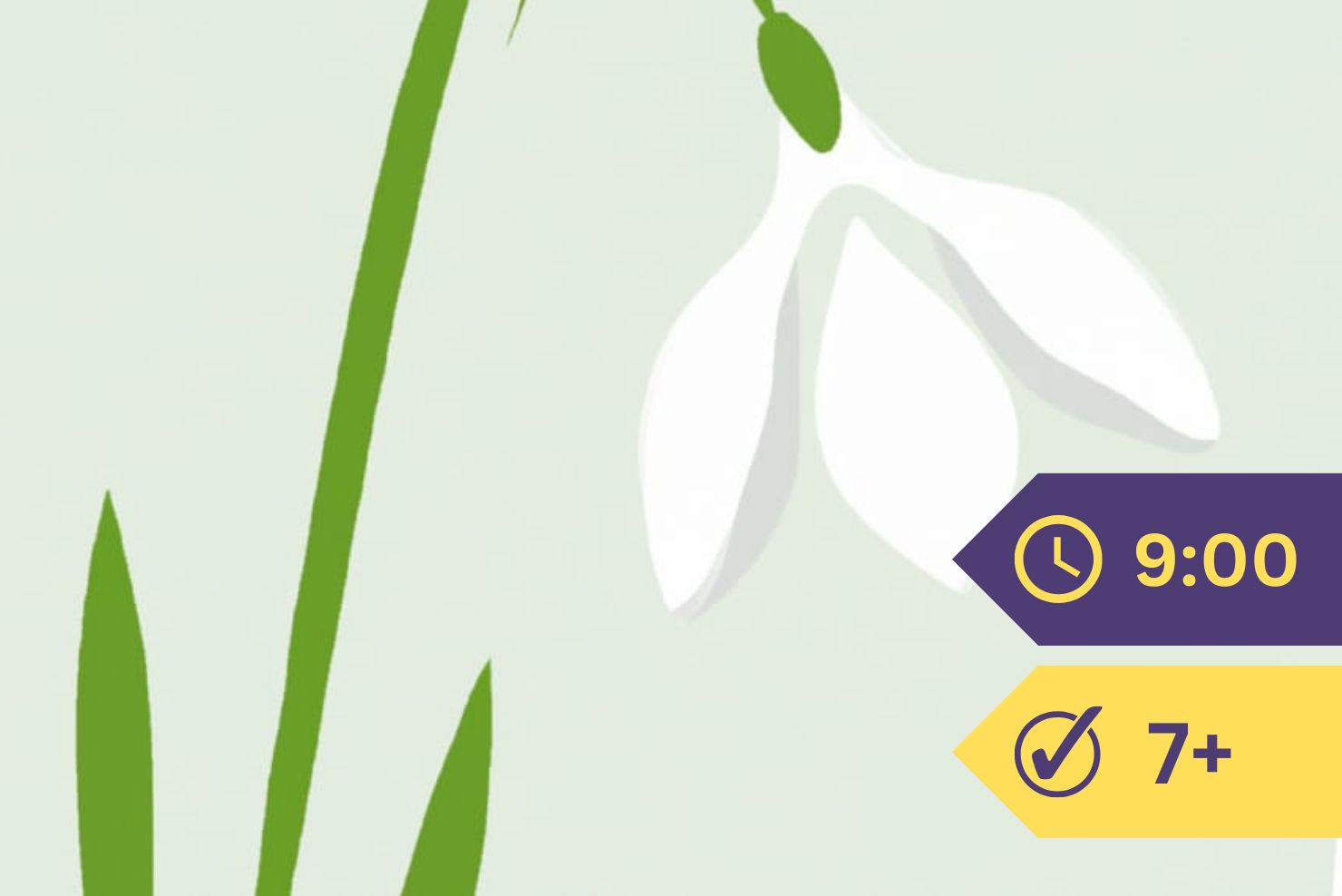The well was very deep, so a long rope was necessary. It was always hard work to turn the lever to lift a bucket of water over the edge of the well. Although the water was clear, the sun never shone far enough into the well to reflect itself in the water. However, as far as the rays reached, greenery grew between the stones in the sides of the well.
A family of toads lived at the bottom of the well. They had, in fact, tumbled head over heels into the well, due to the old Mother-Toad who was still alive. The green frogs, who had long established themselves in the well and swam in the water, called the toads “well-guests.” But the newcomers seemed determined to stay where they were, for they found it very pleasant to live “in a dry place,” as they called the wet stones.
The Mother-Toad had once been a real traveler. She happened to be in the water bucket when it was pulled up, but the light above was too strong for her and she got a pain in her eyes. Fortunately, she managed to crawl out of the bucket, but she fell back into the water with a terrible splash and had to lie in bed for three days, with pain in her back. She didn’t say much about what it was like up there, but she knew for sure, and all the frogs knew it, that the well was not the whole world. The Mother-Toad could have told them a lot more if she had chosen to, but she never answered when they asked her, so they stopped asking.
“She’s really fat, ugly and disgusting,” said the young green frogs; “and her children will be just as ugly as she is.”
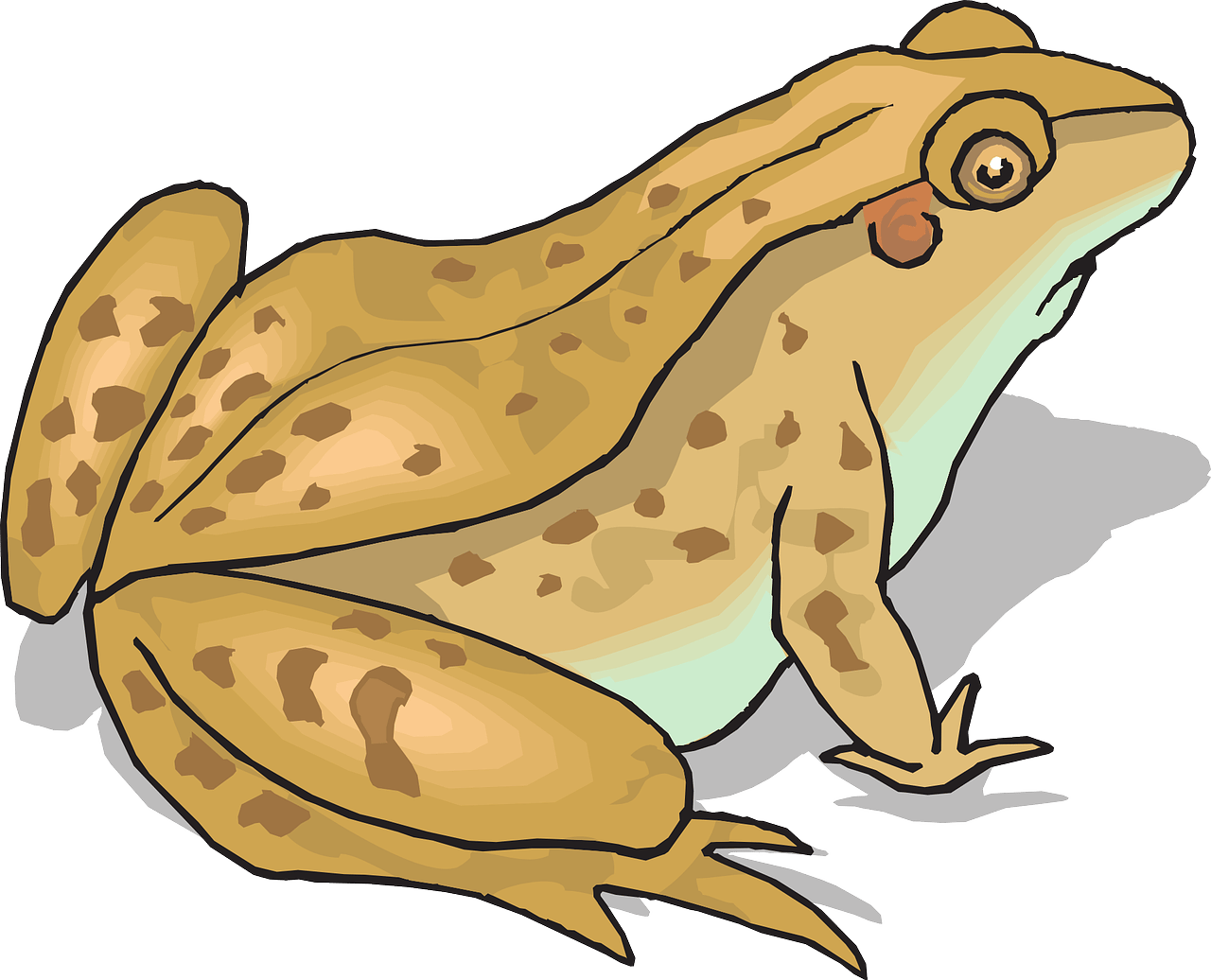
“That may be so,” answered the Mother-Toad, who heard them, “but one of the toads has a jewel in his head, or maybe I have the jewel.”
The young frogs listened and stared; and because they didn’t like these words, they made silly faces and dove underwater. But the little toads kicked their hind legs around out of pure pride, for each of them thought he should have the jewel. Then they sat down and kept their heads still. Finally, they asked what it was that made them so proud, and what kind of thing that jewel could be.
“Oh, it’s such a beautiful and precious thing that I can’t describe it,” said the Mother-Toad. ‘It’s something you carry for your own pleasure, and that makes other people angry. But don’t ask me any more questions, because I won’t give you an answer.”
“Well, I don’t have that jewel,” said the smallest of the toads. She was as ugly as a toad can be. “Why would I have something so valuable? And if it makes others angry, it can’t give me pleasure. No, I would just like to be able to reach the edge of the well and look out. It must be beautiful up there.”
“You’d better stay where you are,” said the old Mother-Toad, “because you know everything here and you can see what you have. Be careful of the bucket, for it can crush you. And even if you get into it safely, you can fall out of it. And not everyone lands as safely as I did, with all their legs and bones intact.”
“Croak, croak,” said the little toad; and that means in our language something like: “Aha!”
The Little Toad had an enormous desire to go to the edge of the well and look over it. She longed so strongly for the green up there. The next morning, when the bucket was lifted and happened to stay still just before the stone on which the Toad sat, as it was filled with water, the heart of the little Toad was touched and she jumped into the filled bucket, which was soon pulled up and emptied.
“Yuck, you nasty beast!” said the laborer who emptied the bucket when he saw the Toad. “You are the ugliest creature I have seen in ages.” And he kicked the Toad with his clog, which just escaped being crushed by climbing into the nettles growing high on the edge of the well. Here she saw a thick forest of stems, but she looked up through them and saw the sun shining through the leaves. She felt like a human who walks in a large dark forest where suddenly the sun shines through the branches and leaves.
“It’s much, much nicer here than down in the well! I could stay here my whole life!” said the little Toad. So she lay there for an hour, yes, even two hours. “I wonder what else there is to be found up here? Because I have come so far, I must try to go even further.” And so she crawled as fast as she could, and stepped out of the green and onto the highway, where the sun shone on her and the dust powdered her everywhere as she marched down the road.
“I’m on a dry spot now, there’s no doubt about that,” said the Toad. “But it’s almost too much of a good thing here, the dust tickles so much.”
She came to a ditch where forget-me-nots grew. A little further away was a hedge of whitethorn, and there were elderberry bushes and bindweed with white flowers. Cheerful colors were to be seen here, and a butterfly fluttered past. The Toad thought it was a flower that had come loose to look better in the world, which seemed very natural to her to do.
“I wish I could make such a journey!” said the Toad. “Croak, what a wealth that would be.”
She spent eight days and eight nights near the well and had no shortage of provisions. On the ninth day, she thought, “Forward! Onward!” But where could she find an even more beautiful place? Maybe somewhere where there was another little Toad or a few green frogs. During the last night, she had heard a sound carried by the wind, as if there were cousins nearby.
“It’s wonderful to be alive! Wonderful to come out of the well and lie among the nettles and crawl along the dusty road. But I have to go further, always further! So that I find frogs or a little Toad. We can’t do without each other. Nature alone is not enough company.” And so she continued on her journey.
She came out into an open field, at a large pond, surrounded by reeds. She walked into the pond.
“It might be a bit too damp for you,” said the frogs. “But you are welcome! Are you a he or a she? But it doesn’t matter, you are just as welcome.”
In the evening, she was invited to a concert. The family concert of the frogs, given with great enthusiasm. We hear that sometimes! No refreshments were given during the concert, but there was plenty to drink because the water from the pond was free.
“Now I will resume my journey,” said the little Toad, for she always felt a desire for something better.
She saw the stars shining, so big and so bright, and she saw the moon gleaming; and then she saw the sun rise and climb higher and higher.
And she thought: “Maybe I am still in a hole, only in a bigger one. I need to go higher. I feel a great restlessness and longing to go even higher.”
And when the moon became round and full, the poor creature thought: “I wonder if that is the bucket that will be lowered and in which I must step to go higher? Or is the sun the big bucket? How bright it is! It can handle anything. But I must be careful not to miss my chance. Oh, how it shines in my head! I don’t think the jewel could shine brighter. But I don’t have the jewel. I’m not sad about that, no, I just need to go higher, in splendor and joy! I feel so confident, and yet I am afraid. It is a difficult step to take, and yet it must be taken. Forward, straight ahead!”
She took a few steps, like a crawling creature can do, and soon found herself on a road where people lived. There were both flower gardens and vegetable gardens near the houses. And she sat down to rest in a vegetable garden.
“What a large number of different creatures that I have never known! How beautiful and grand the world is! But you have to look around in it and not stay in one place.” And then she jumped into the vegetable garden. “How green it is here! How beautiful it is!”
“I know,” said the caterpillar on the leaf, “my leaf is the largest here. It houses half the world for me, but I don’t care about the world anyway.”
“Cluck, cluck, cluck.” A few clucking chickens came along. They roamed in the cabbage garden. The chicken that marched in front had a long face. She saw the caterpillar on the green leaf and pecked at it, causing the caterpillar to fall to the ground, where it wriggled and writhed.
The chicken looked at this first with one eye and then with the other, because she didn’t know what the end of this wriggling would be.
“He’s not doing that because he likes it,” thought the chicken, and raised her head to peck at the caterpillar.
The toad was so scared that she crawled straight toward the chicken.
“Aha, that wriggling thing has allies,” said the chicken. “Look at that crawling thing!” And then the chicken turned up her beak. “I don’t care about that green snack, it would only tickle in my throat.” The other chickens had the same idea and they all turned around and ran away together.
“I wriggled free,” said the caterpillar. “It’s great to have presence of mind these days! But the hardest part is yet to come, and that is getting back on my leaf. Where is it?”
The little toad came forward and expressed her sympathy. She was glad she had scared the chickens with her ugliness.
“What do you mean?” cried the caterpillar. “I wriggled away from those chickens myself. You’re very unpleasant to look at. Can’t I be left alone on my own property? Now I smell cabbage, now I’m near my leaf. Nothing is as beautiful as your own property. But I must go higher.”
“Yes, higher,” said the little toad. “Higher! She feels just like me, but she’s not in a good mood today. That must be from the scare. We all want to go higher.” And she looked as high as she could.
A stork sat in its nest on the roof of the farmhouse. It clapped its beak, and the mother stork clapped hers.
“How high they live!” thought the Toad. “If only I could be that high!”
Two young students lived in the farmhouse. One was a poet and the other a scientific researcher who delved into the secrets of nature. The poet sang and wrote joyfully about everything in nature and how it was reflected in his heart. He sang it with beautiful words, sweetly, richly, in well-sounding verses.
The other student studied the wonders of nature and even cut them open where necessary. He regarded the creation of nature as a great mathematical problem and tried to know it inside and out and explain it clearly. He was very clever. They were good, cheerful men, those two.
“There’s a good example of a toad,” said the naturalist. “I must open it up quickly and put it in a bottle of strong water.”
“You already have two,” replied the poet. “Let the creature sit there and enjoy its life.”
“But this creature is so wonderfully ugly,” persisted the former.
“Yes, if we could only find the jewel in its head,” said the poet, “then I would be in favor of opening it up.”
“A jewel!” exclaimed the naturalist. “You seem to know a lot about natural history.”
“But isn’t there something beautiful in the popular belief that the toad is the ugliest of all animals, yet it carries the most precious jewel in its head? Isn’t that just the same with people? What a jewel Aesop would have had, and Socrates, he was quite special.”
The Toad heard nothing more and did not understand half of what she had heard. The two friends walked on and so the Toad escaped the fate of being cut in half and put in a bottle of strong water.
“Those two were also talking about the jewel,” said the Toad to herself. “What a good thing I didn’t get it! I would have been in a very unpleasant position.”
Then there was a flapping against the roof of the farmhouse. Father Stork made a speech to his family and they looked down at the two young men in the vegetable garden.
“Man is the most arrogant creature!” said the stork. “Listen to their jaws wag and despite that they can’t flap properly. They boast about their gifts, their eloquence, and their language! Yes, really a beautiful language! But that language changes every new day. And they don’t understand each other’s language. Now, we can at least speak our language all over the earth, both in the north and in southern Egypt.
And humans can’t even fly. They rush about by means of an invention they call a ‘railroad,’ but they often break their necks on it. My beak gets cold when I think about it. The world could really do without humans. We could do very well without them, as long as we have frogs and earthworms.”
“That was a powerful speech,” thought the little Toad. “What a great man he is over there! And how high he sits! Higher than I have ever seen anyone sit. And he can surely swim too!” she cried, as the stork soared through the air with outstretched wings.
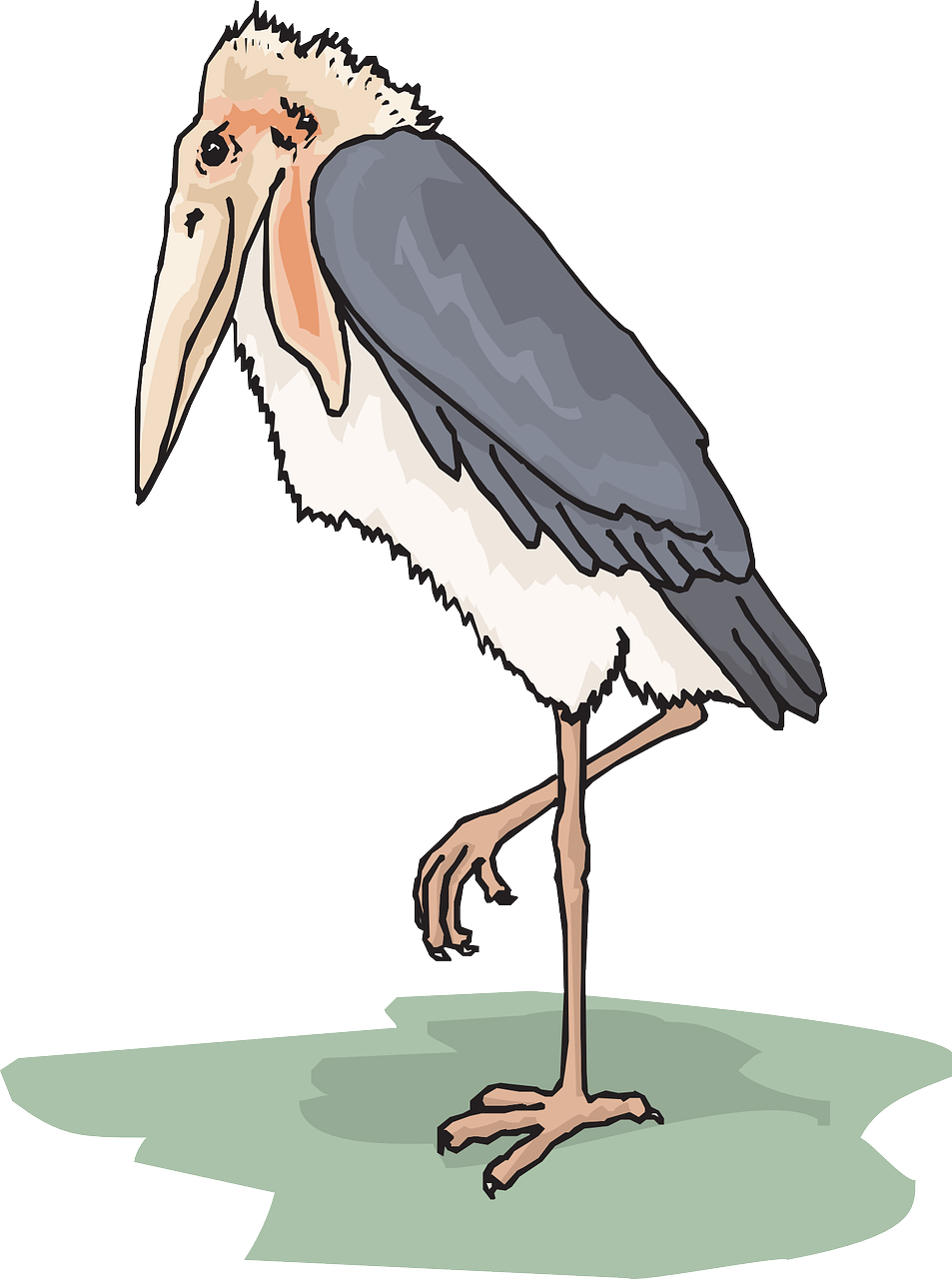
The mother stork began talking to her children in the nest, telling them about Egypt and the waters of the Nile, and the incomparable mud to be found in that strange land. All of this sounded new and very adventurous to the little frog.
“I know, I must go to Egypt!” she said. “If the stork or one of his young ones would only take me! I would give him something else in exchange. Yes, I will go to Egypt, for then I will feel so happy! All the longing and all the pleasure I feel is much better than having a jewel in my head.”
But the little frog was just the one who had the jewel. That jewel was the constant striving and desire to go higher, always higher. It shone in her head, it shone with joy, it shone brightly in her as her longing.
Then suddenly the stork came down. He had seen the frog in the grass, stooped and grabbed the creature anything but gently. The stork’s beak pinched her and the wind whistled as he rose again. It was not exactly pleasant, but at least she was going up – up to Egypt – that she knew for sure, and so her eyes sparkled and there seemed to be a flash shooting out.
“Kroawk, kroawk,” she cried.
Then the body was dead – the whole frog was killed! But what became of the spark that had shot from her eyes? The sunbeam picked it up and the sunbeam carried the jewel from the frog’s head. But where did it take it? Don’t ask the naturalist, but rather ask the poet. He will tell you under the guise of a fairy tale. The caterpillar on the cabbage, and the stork family are also part of the story.
And remember, the caterpillar has changed, it changes with time into a beautiful butterfly. The stork family flies over mountains and seas, all the way to far-off Africa, and yet always finds the shortest way back home to the same country – to the same roof. No, that is almost too improbable to be true, and yet it is true. You can ask the naturalist, he will confirm that it is so, and you know it yourself, because you have seen it.
But the jewel in the frog’s head?
Look for it in the sun, see it there, there you will find it!
But the brilliance is too blinding. We humans do not yet have eyes that can see all the splendors and wonders of nature, but that will soon change. That will be the most beautiful story ever, and we will all be a part of it.
